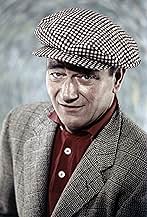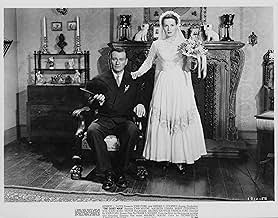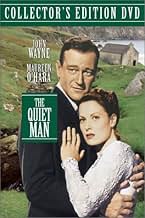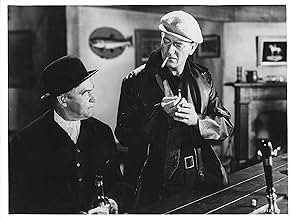NOTE IMDb
7,7/10
45 k
MA NOTE
Un boxer américain à la retraite revient dans son village natal en Irlande et y rencontre l'amour.Un boxer américain à la retraite revient dans son village natal en Irlande et y rencontre l'amour.Un boxer américain à la retraite revient dans son village natal en Irlande et y rencontre l'amour.
- Réalisation
- Scénario
- Casting principal
- Récompensé par 2 Oscars
- 15 victoires et 10 nominations au total
Charles B. Fitzsimons
- Hugh Forbes
- (as CHARLES fitzSIMONS)
James O'Hara
- Father Paul
- (as James Lilburn)
Sean McClory
- Owen Glynn
- (as Sean McGlory)
Jack MacGowran
- Ignatius Feeney
- (as Jack McGowran)
Avis à la une
I'll spare you with the plot description (others on this page have done so), but there are reasons why I love this film.
First, the performances. Wayne as the re-patriated Irish-American, O'Hara as the fiesty Mary Kate, Fitzgerald as the sly little old man, Bond as the strong-willed priest, and McLaglen as the blustering blow-hard. Directed by John Ford, they were unconquerable.
Second, the cinematography. The landscapes are lush and rolling. The interior shots are filled with little details that add so much to the scene. You can almost imagine what the Cohen's pub must smell like ("Over here, we pronounce it, CO-han!"). And in almost every shot, there is the color green.
Third, the writing and the lines. My family quotes the film like gospel. I was helping to move a bed into a house, and as I entered through the front door, I somberly spoke "God bless all here." We all got the joke.
Fourth, the music. So perfectly chosen and composed. It adds to each and every scene.
Fifth, the fight scene. A classic Irish donnybrook!
So many things about this film I cherish. Also, it's one of the few films that John Wayne doesn't shoot a gun! A marvelous, marvelous film! In their book "The Big Damn Book of Sheer Manliness", the Von Hoffman brothers called this film one of the "top 25 greatest guy movies of all time". Who am I to argue?
First, the performances. Wayne as the re-patriated Irish-American, O'Hara as the fiesty Mary Kate, Fitzgerald as the sly little old man, Bond as the strong-willed priest, and McLaglen as the blustering blow-hard. Directed by John Ford, they were unconquerable.
Second, the cinematography. The landscapes are lush and rolling. The interior shots are filled with little details that add so much to the scene. You can almost imagine what the Cohen's pub must smell like ("Over here, we pronounce it, CO-han!"). And in almost every shot, there is the color green.
Third, the writing and the lines. My family quotes the film like gospel. I was helping to move a bed into a house, and as I entered through the front door, I somberly spoke "God bless all here." We all got the joke.
Fourth, the music. So perfectly chosen and composed. It adds to each and every scene.
Fifth, the fight scene. A classic Irish donnybrook!
So many things about this film I cherish. Also, it's one of the few films that John Wayne doesn't shoot a gun! A marvelous, marvelous film! In their book "The Big Damn Book of Sheer Manliness", the Von Hoffman brothers called this film one of the "top 25 greatest guy movies of all time". Who am I to argue?
The Quiet Man is a wonderfully layered and at times hilariously ironic portrayal of Ireland as seen by an American.
For those who doubt the film's sense of irony, just re-watch the scene where Sean (John Wayne) paints the door of his cottage. The Vicar's wife remarks on its beauty and in a deadpan manner suggests "only an American would have thought of Emerald Green". Only an American (or a foreigner), is the implication, would think that the picturebook Ireland they are seeing in this film is a realistic portrayal of a lived experience of the country. An Irish person would have painted the door red, she says. It weathers better that way.
The film takes ideas of Irishness and exaggerates them to brilliant and comic effect. The drinking Mickaleen, the patriarchal rule, the idyllic countryside. But beneath the Oirish exterior is a sharp intelligence and a subversion of what the film at first glance seems to suggest.
Beneath the idyllic countryside are elemental forces that are waiting to be disturbed, as we see in the two scenes where Sean and Mary-kate kiss. Storm clouds fill the sky and the wind whips about them. The countryside which previously seemed so welcoming is now tempestuous and threatening. Theirs are passions which do not fit in the comic book world which we have previously seen. Yet they exist.
The portrayal of women, and particularly Sean's treatment of Mary-Kate when he drags her through the field is not so oppressive as it might seem. Remember that it is her who insists on receiving her dowry, who equates her possessions to her worth. It is she who forces Sean to act the way he does and fight Will Danaher. She indoctrinates him into her society by threatening to leave him. She withholds the marital bed. Sean eventually becomes the man she wants him to be.
In short this is a portrayal of Irish, or more importantly, rural life that is very much from the point of view of the outsider. Of the city folk. Yet it always acknowledges that and has great fun playing with its stereotypes. Its funny, its romantic, it appeals to the part of us that yearns to live a simple life away from the complex world, much as we know that life does not exist. Enjoy it!
For those who doubt the film's sense of irony, just re-watch the scene where Sean (John Wayne) paints the door of his cottage. The Vicar's wife remarks on its beauty and in a deadpan manner suggests "only an American would have thought of Emerald Green". Only an American (or a foreigner), is the implication, would think that the picturebook Ireland they are seeing in this film is a realistic portrayal of a lived experience of the country. An Irish person would have painted the door red, she says. It weathers better that way.
The film takes ideas of Irishness and exaggerates them to brilliant and comic effect. The drinking Mickaleen, the patriarchal rule, the idyllic countryside. But beneath the Oirish exterior is a sharp intelligence and a subversion of what the film at first glance seems to suggest.
Beneath the idyllic countryside are elemental forces that are waiting to be disturbed, as we see in the two scenes where Sean and Mary-kate kiss. Storm clouds fill the sky and the wind whips about them. The countryside which previously seemed so welcoming is now tempestuous and threatening. Theirs are passions which do not fit in the comic book world which we have previously seen. Yet they exist.
The portrayal of women, and particularly Sean's treatment of Mary-Kate when he drags her through the field is not so oppressive as it might seem. Remember that it is her who insists on receiving her dowry, who equates her possessions to her worth. It is she who forces Sean to act the way he does and fight Will Danaher. She indoctrinates him into her society by threatening to leave him. She withholds the marital bed. Sean eventually becomes the man she wants him to be.
In short this is a portrayal of Irish, or more importantly, rural life that is very much from the point of view of the outsider. Of the city folk. Yet it always acknowledges that and has great fun playing with its stereotypes. Its funny, its romantic, it appeals to the part of us that yearns to live a simple life away from the complex world, much as we know that life does not exist. Enjoy it!
I like The Quiet Man so much that it features in my top three favourite films. This incidentally is alongside quite disparate films as Blade Runner and The Shawshank Redemption.
This is nothing to do with direction, acting or even location but simply because it feels so good!
Yes it is a simple story but it's amusing, very easy to watch and leaves you with a warm glow and a smile. Also the building of the "diddly diddly music" approaching the fight sequence is a delight.
That's all I need from a film that does not pretend to be anything more than a story.
This is nothing to do with direction, acting or even location but simply because it feels so good!
Yes it is a simple story but it's amusing, very easy to watch and leaves you with a warm glow and a smile. Also the building of the "diddly diddly music" approaching the fight sequence is a delight.
That's all I need from a film that does not pretend to be anything more than a story.
Maureen O'Hara in Technicolor is surely any Irishman's dream, and "The Quiet Man" would be timeless for that alone. But O'Hara's performance is all the more indelible for the great good humor she bestows on her character, Mary Kate Danaher. Let's face it; with any other actress, this could have been a disaster.
Sean Thornton (John Wayne) comes back to County Mayo, his birthplace, to find a peace he lost tragically back home in America. He immediately discovers some old friends, and a new one, too, Mary Kate, who while herding sheep stares back at him in what James Joyce might have called "a significant manner."
Director John Ford elects to shoot O'Hara from an odd angle, and with an unusual overhead shadow crossing O'Hara's face, that in anyone else's hands would have totally blown the shot but here creates something, well, "Homerific." It's one of many amazing shots in a film that seems more painted than photographed, and is perhaps the most strikingly lovely film ever made.
The shot of O'Hara looking back at Wayne also clues you onto something else, that this is going to be her story as much as it is Thornton's. In fact, it's really more about her than it is about him, a film about romance and a woman's liberation at the hands of her lover. We call them "chick flicks" today. But since John Wayne is the nominal star and no one ever confused Ford with Douglas Sirk, "The Quiet Man" isn't popularly regarded this way.
It's fun to read all the comments about poor Mary Kate and how this film glamorizes the mistreatment of women. They have one thing right, it's a film about spousal domination, but it's the wife ruling the husband. Think about it: She makes her lover do just about everything he does in the film, even risk bodily injury at the hands of her brutish brother (she doesn't know about his past and thinks she married "a coward.") People complain that he drags her across a dung-covered field, while a helpful woman hands him a stick "to beat the lovely lady with." But of course it's Mary Kate who's in total control of the situation. She wants Thornton to fight for her, in every sense of the word, and won't make it easy. She wants him to adapt to her culture, rather than adapt to his. (She's not one to be "honked at," as she puts it.) It's not surprising she trips and falls at one point while Thornton pulls her across a field; probably one of those puppet strings of hers got in the way.
But there are worse things in life than being enslaved by the likes of Maureen O'Hara, like not being enslaved by the likes of Maureen O'Hara. She's not only beautiful and pure-hearted, but such a hilarious joy to be around. O'Hara plays up the comedy of her scenes very well; she could have opted for a more regal distance from the slapstick but plays it as rowdy as the rest instead. The scene when she spits in her hand before shaking with matchmaker Michaleen Flynn (Barry Fitzgerald, who gives the next-best performance after O'Hara) tells you who she is better than any of her many sexy moments on screen. It also gets back to the point of why she's so essential in this film. She is Ireland, the spirit of Erin, and you want her to win, not because she's so pretty but because you know she's good and right for Sean, too.
About the only things wrong with the film are the action sequences, the horse race and the fistfight between Sean and Mary Kate's brother. It's not because the scenes aren't terrific, but because they are so abbreviated, especially the fistfight, which feels likes its building to something even funnier and more rousing than what's come before when it just sort of stops. Ford apparently had to do some cutting to get his film in at the required length, and with his focus as much on Mary Kate as possible, probably preferred to trim the scenes that had the least to do with her. But since the focus on O'Hara is what makes the film anyway, this is a small matter. Wayne fans wanting more action will just have to content themselves with almost every other film the Duke ever made.
Seeing this film for the first time reminded me a lot of "Local Hero," the 1982 comedy. Not only is "The Quiet Man" also a fish-out-of-water story about an American in the British Isles (Scotland in "Local Hero"), both films maintain a very delicate balancing act between whimsy and pathos, with "The Quiet Man," siding on the former direction and "Local Hero" the latter. Definitely worth checking out the one if you saw and liked the other. But "Quiet Man" was there first.
Sean Thornton (John Wayne) comes back to County Mayo, his birthplace, to find a peace he lost tragically back home in America. He immediately discovers some old friends, and a new one, too, Mary Kate, who while herding sheep stares back at him in what James Joyce might have called "a significant manner."
Director John Ford elects to shoot O'Hara from an odd angle, and with an unusual overhead shadow crossing O'Hara's face, that in anyone else's hands would have totally blown the shot but here creates something, well, "Homerific." It's one of many amazing shots in a film that seems more painted than photographed, and is perhaps the most strikingly lovely film ever made.
The shot of O'Hara looking back at Wayne also clues you onto something else, that this is going to be her story as much as it is Thornton's. In fact, it's really more about her than it is about him, a film about romance and a woman's liberation at the hands of her lover. We call them "chick flicks" today. But since John Wayne is the nominal star and no one ever confused Ford with Douglas Sirk, "The Quiet Man" isn't popularly regarded this way.
It's fun to read all the comments about poor Mary Kate and how this film glamorizes the mistreatment of women. They have one thing right, it's a film about spousal domination, but it's the wife ruling the husband. Think about it: She makes her lover do just about everything he does in the film, even risk bodily injury at the hands of her brutish brother (she doesn't know about his past and thinks she married "a coward.") People complain that he drags her across a dung-covered field, while a helpful woman hands him a stick "to beat the lovely lady with." But of course it's Mary Kate who's in total control of the situation. She wants Thornton to fight for her, in every sense of the word, and won't make it easy. She wants him to adapt to her culture, rather than adapt to his. (She's not one to be "honked at," as she puts it.) It's not surprising she trips and falls at one point while Thornton pulls her across a field; probably one of those puppet strings of hers got in the way.
But there are worse things in life than being enslaved by the likes of Maureen O'Hara, like not being enslaved by the likes of Maureen O'Hara. She's not only beautiful and pure-hearted, but such a hilarious joy to be around. O'Hara plays up the comedy of her scenes very well; she could have opted for a more regal distance from the slapstick but plays it as rowdy as the rest instead. The scene when she spits in her hand before shaking with matchmaker Michaleen Flynn (Barry Fitzgerald, who gives the next-best performance after O'Hara) tells you who she is better than any of her many sexy moments on screen. It also gets back to the point of why she's so essential in this film. She is Ireland, the spirit of Erin, and you want her to win, not because she's so pretty but because you know she's good and right for Sean, too.
About the only things wrong with the film are the action sequences, the horse race and the fistfight between Sean and Mary Kate's brother. It's not because the scenes aren't terrific, but because they are so abbreviated, especially the fistfight, which feels likes its building to something even funnier and more rousing than what's come before when it just sort of stops. Ford apparently had to do some cutting to get his film in at the required length, and with his focus as much on Mary Kate as possible, probably preferred to trim the scenes that had the least to do with her. But since the focus on O'Hara is what makes the film anyway, this is a small matter. Wayne fans wanting more action will just have to content themselves with almost every other film the Duke ever made.
Seeing this film for the first time reminded me a lot of "Local Hero," the 1982 comedy. Not only is "The Quiet Man" also a fish-out-of-water story about an American in the British Isles (Scotland in "Local Hero"), both films maintain a very delicate balancing act between whimsy and pathos, with "The Quiet Man," siding on the former direction and "Local Hero" the latter. Definitely worth checking out the one if you saw and liked the other. But "Quiet Man" was there first.
One of the best directed by John Ford. An emotional, humorous look at an American, played by John Wayne, going back to his native Ireland and trying to fit in with the present culture. Sensational scenery and the grand music by Victor Young support this classic among classics. Breezy and rowdy. Too beautiful to turn your back on. A great illustration of romance. The interaction between Wayne and Maureen O'Hara is magical and hard to beat.
Other classic performances are turned in by Victor McLaglen, Ward Bond and Barry Fitzgerald.
Other classic performances are turned in by Victor McLaglen, Ward Bond and Barry Fitzgerald.
Le saviez-vous
- AnecdotesAt the film's conclusion, after the credits, we see Kate and Sean standing in their garden waving good-bye. Maureen O'Hara turns to John Wayne and whispers something in his ear, evoking a priceless reaction from Wayne. What was said was known only to O'Hara, Wayne and director John Ford. In exchange for saying this unscripted bit of text, O'Hara insisted that the exact line never be disclosed by any involved parties. In her memoirs she says that she refused to say the line at first as she "couldn't possibly say that to Duke", but Ford insisted, claiming he needed a genuine shock reaction from Wayne. The line remains a mystery to this day.
- GaffesBefore Sean enters Mary Kate's home to ask her brother's permission to court her, the flowers he's carrying are very sad looking. After he enters the house, they change into a nice, full, colorful bouquet.
- Citations
Mary Kate Danaher: Could you use a little water in your whiskey?
Michaleen Flynn: When I drink whiskey, I drink whiskey; and when I drink water, I drink water.
- ConnexionsFeatured in Directed by John Ford (1971)
- Bandes originalesThe Wild Colonial Boy
(uncredited)
Traditional
Adapted by Sean O'Casey and Dennis O'Casey
Performed by John Wayne, Ken Curtis, and Francis Ford and others in the Pub
Reprised a cappella by Wayne and Victor McLaglen
Meilleurs choix
Connectez-vous pour évaluer et suivre la liste de favoris afin de recevoir des recommandations personnalisées
Détails
Box-office
- Budget
- 1 750 000 $US (estimé)
- Durée
- 2h 9min(129 min)
- Rapport de forme
- 1.37 : 1
Contribuer à cette page
Suggérer une modification ou ajouter du contenu manquant





















